Kyocera FS-6025, FS-6030MFP Service Manual

FS-6025MFP /B FS-6030MFP TASKalfa 255 /b TASKalfa 305
SERVICE
MANUAL
Published in December 2012
842K3119
2K3SM069
Rev.9
CAUTION
RISK OF EXPLOSION IF BATTERY IS REPLACED BY AN INCORRECT TYPE. DISPOSE OF USED BATTERIES ACCORDING TO THE INSTRUCTIONS.
It may be illegal to dispose of this battery into the municipal waste stream. Check with your local solid waste officials for details in your area for proper disposal.
ATTENTION
IL Y A UN RISQUE D’EXPLOSION SI LA BATTERIE EST REMPLACEE PAR UN MODELE DE TYPE INCORRECT. METTRE AU REBUT LES BATTERIES UTILISEES SELON LES INSTRUCTIONS DONNEES.
Il peut être illégal de jeter les batteries dans des eaux d’égout municipales. Vérifiez avec les fonctionnaires municipaux de votre région pour les détails concernant des déchets solides et une mise au rebut appropriée.
Revision history
Revision |
Date |
Replaced pages |
Remarks |
|
|
|
|
1 |
17 December 2010 |
CONTENTS, 1-1-1 to 1-1-4, 1-1-8, 1-2-8, 1-2-9, |
- |
|
|
1-2-12, 1-2-13, 1-3-1, 1-3-2, 1-3-12, 1-3-35, 1-3-60, |
|
|
|
1-3-61, 1-3-63, 1-3-84, 1-4-6, 1-4-20, 1-5-8, 1-5-32, |
|
|
|
2-3-23, 2-3-26, 2-4-4 |
|
|
|
|
|
2 |
24 January 2011 |
1-3-71 |
- |
|
|
|
|
3 |
6 April 2011 |
CONTENTS, 1-2-13, 1-3-2 to 1-3-6, 1-3-23, |
- |
|
|
1-3-42,1-3-43, 1-3-69 to 1-3-95,1-4-8 |
|
|
|
|
|
4 |
1 July 2011 |
CONTENTS, 1-3-2 to 1-3-6, 1-3-18, 1-3-19, 1-3-20, |
- |
|
|
1-3-26, 1-3-27, 1-3-29, 1-3-30, 1-3-32, 1-3-34, |
|
|
|
1-3-36, 1-3-38, 1-3-39, 1-3-40 to 1-3-44, 1-3-47, |
|
|
|
1-3-56, 1-3-107, 1-3-108, 1-4-8 to 1-4-14, 1-5-25, |
|
|
|
1-5-26, 2-1-9, 2-2-4 to 2-2-6, Address |
|
|
|
|
|
5 |
7 November 2011 |
CONTENTS, 1-3-38, 1-3-47, 1-3-64, 1-3-65, |
- |
|
|
1-3-102, 1-5-34, 1-6-1 to 1-6-4, 2-2-4, 2-2-5 |
|
|
|
|
|
6 |
17 February 2012 |
1-1-1, 1-1-3, 1-1-4, 1-3-71, Address |
- |
|
|
|
|
7 |
20 June 2012 |
1-3-12, 1-4-20, Address |
- |
|
|
|
|
8 |
20 August 2012 |
1-3-65, 2-4-12 |
- |
|
|
|
|
9 |
1 December 2012 |
CONTENTS, 1-6-2, 2-4-9 |
- |
|
|
|
|

This page is intentionally left blank.
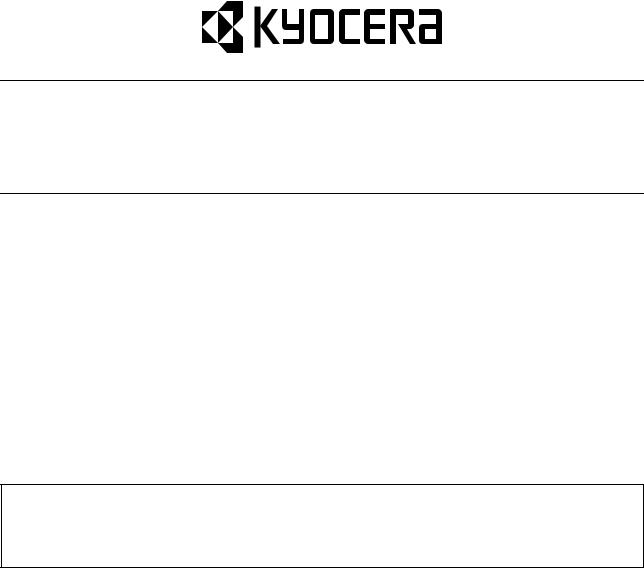
Safety precautions
This booklet provides safety warnings and precautions for our service personnel to ensure the safety of their customers, their machines as well as themselves during maintenance activities. Service personnel are advised to read this booklet carefully to familiarize themselves with the warnings and precautions described here before engaging in maintenance activities.
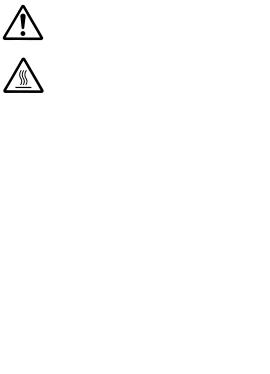
Safety warnings and precautions
Various symbols are used to protect our service personnel and customers from physical danger and to prevent damage to their property. These symbols are described below:
 DANGER: High risk of serious bodily injury or death may result from insufficient attention to or incorrect compliance with warning messages using this symbol.
DANGER: High risk of serious bodily injury or death may result from insufficient attention to or incorrect compliance with warning messages using this symbol.
 WARNING: Serious bodily injury or death may result from insufficient attention to or incorrect compliance with warning messages using this symbol.
WARNING: Serious bodily injury or death may result from insufficient attention to or incorrect compliance with warning messages using this symbol.
 CAUTION: Bodily injury or damage to property may result from insufficient attention to or incorrect compliance with warning messages using this symbol.
CAUTION: Bodily injury or damage to property may result from insufficient attention to or incorrect compliance with warning messages using this symbol.
Symbols
The triangle ( ) symbol indicates a warning including danger and caution. The specific point of attention is shown inside the symbol.
) symbol indicates a warning including danger and caution. The specific point of attention is shown inside the symbol.
General warning. |
Warning of risk of electric shock. |
Warning of high temperature.
 indicates a prohibited action. The specific prohibition is shown inside the symbol.
indicates a prohibited action. The specific prohibition is shown inside the symbol.
General prohibited action. |
Disassembly prohibited. |
 indicates that action is required. The specific action required is shown inside the symbol.
indicates that action is required. The specific action required is shown inside the symbol.
General action required. |
Remove the power plug from the wall outlet. |
Always ground the copier.

1. Installation Precautions
 WARNING
WARNING
•Do not use a power supply with a voltage other than that specified. Avoid multiple connections to one outlet: they may cause fire or electric shock. When using an extension cable, always check that it is adequate for the rated current. .....................................................................................................
•Connect the ground wire to a suitable grounding point. Not grounding the copier may cause fire or electric shock. Connecting the earth wire to an object not approved for the purpose may cause explosion or electric shock. Never connect the ground cable to any of the following: gas pipes, lightning rods, ground cables for telephone lines and water pipes or faucets not approved by the proper authorities. ..........................................................................................................................................
 CAUTION:
CAUTION:
•Do not place the copier on an infirm or angled surface: the copier may tip over, causing injury. .........
•Do not install the copier in a humid or dusty place. This may cause fire or electric shock. .................
•Do not install the copier near a radiator, heater, other heat source or near flammable material. This may cause fire. ...................................................................................................................................
•Allow sufficient space around the copier to allow the ventilation grills to keep the machine as cool as possible. Insufficient ventilation may cause heat buildup and poor copying performance. ............
•Always handle the machine by the correct locations when moving it. .................................................
•Always use anti-toppling and locking devices on copiers so equipped. Failure to do this may cause the copier to move unexpectedly or topple, leading to injury. ..............................................................
•Avoid inhaling toner or developer excessively. Protect the eyes. If toner or developer is accidentally ingested, drink a lot of water to dilute it in the stomach and obtain medical attention immediately. If it gets into the eyes, rinse immediately with copious amounts of water and obtain medical atten-
tion. .....................................................................................................................................................
•Advice customers that they must always follow the safety warnings and precautions in the copier’s instruction handbook. .........................................................................................................................

2. Precautions for Maintenance
 WARNING
WARNING
•Always remove the power plug from the wall outlet before starting machine disassembly. ................
•Always follow the procedures for maintenance described in the service manual and other related brochures. ..........................................................................................................................................
•Under no circumstances attempt to bypass or disable safety features including safety mechanisms and protective circuits. ........................................................................................................................
•Always use parts having the correct specifications. ............................................................................
•Always use the thermostat or thermal fuse specified in the service manual or other related brochure when replacing them. Using a piece of wire, for example, could lead to fire or other serious accident. ...................................................................................................................................................
•When the service manual or other serious brochure specifies a distance or gap for installation of a part, always use the correct scale and measure carefully. ..................................................................
•Always check that the copier is correctly connected to an outlet with a ground connection. ...............
•Check that the power cable covering is free of damage. Check that the power plug is dust-free. If it is dirty, clean it to remove the risk of fire or electric shock. .................................................................
•Never attempt to disassemble the optical unit in machines using lasers. Leaking laser light may damage eyesight. ...............................................................................................................................
•Handle the charger sections with care. They are charged to high potentials and may cause electric shock if handled improperly. ...............................................................................................................
 CAUTION
CAUTION
•Wear safe clothing. If wearing loose clothing or accessories such as ties, make sure they are safely secured so they will not be caught in rotating sections. ......................................................................
•Use utmost caution when working on a powered machine. Keep away from chains and belts. ..........
•Handle the fixing section with care to avoid burns as it can be extremely hot. ..................................
•Check that the fixing unit thermistor, heat and press rollers are clean. Dirt on them can cause abnormally high temperatures. ...........................................................................................................

•Do not remove the ozone filter, if any, from the copier except for routine replacement. ......................
•Do not pull on the AC power cord or connector wires on high-voltage components when removing them; always hold the plug itself. ........................................................................................................
•Do not route the power cable where it may be stood on or trapped. If necessary, protect it with a cable cover or other appropriate item. ................................................................................................
•Treat the ends of the wire carefully when installing a new charger wire to avoid electric leaks. ..........
•Remove toner completely from electronic components. .....................................................................
•Run wire harnesses carefully so that wires will not be trapped or damaged. ......................................
•After maintenance, always check that all the parts, screws, connectors and wires that were removed, have been refitted correctly. Special attention should be paid to any forgotten connector, trapped wire and missing screws. .......................................................................................................
•Check that all the caution labels that should be present on the machine according to the instruction handbook are clean and not peeling. Replace with new ones if necessary. .......................................
•Handle greases and solvents with care by following the instructions below: ......................................
·Use only a small amount of solvent at a time, being careful not to spill. Wipe spills off completely.
·Ventilate the room well while using grease or solvents.
·Allow applied solvents to evaporate completely before refitting the covers or turning the power switch on.
·Always wash hands afterwards.
•Never dispose of toner or toner bottles in fire. Toner may cause sparks when exposed directly to fire in a furnace, etc. ...........................................................................................................................
•Should smoke be seen coming from the copier, remove the power plug from the wall outlet immediately. ...................................................................................................................................................
3. Miscellaneous
 WARNING
WARNING
•Never attempt to heat the drum or expose it to any organic solvents such as alcohol, other than the specified refiner; it may generate toxic gas. ........................................................................................
•Keep the machine away from flammable liquids, gases, and aerosols. A fire or an electric shock might occur. ........................................................................................................................................

This page is intentionally left blank.
|
|
2K3/2L3-5 |
|
CONTENTS |
|
1-1 Specifications |
|
|
1-1-1 Specifications ........................................................................................................................ |
1-1-1 |
|
1-1-2 Parts names .......................................................................................................................... |
1-1-5 |
|
(1) |
Machine (front side).......................................................................................................... |
1-1-5 |
(2) |
Machine (rear side)........................................................................................................... |
1-1-7 |
(3) |
Operation panel ................................................................................................................ |
1-1-8 |
1-1-3 Machine cross section ........................................................................................................... |
1-1-9 |
|
1-2 Installation |
|
|
1-2-1 Installation environment......................................................................................................... |
1-2-1 |
|
1-2-2 Unpacking and installation..................................................................................................... |
1-2-2 |
|
(1) |
Installation procedure ....................................................................................................... |
1-2-2 |
(2) |
Setting initial copy modes............................................................................................... |
1-2-13 |
1-2-3 Install the expansion memory (option)................................................................................. |
1-2-14 |
|
1-3 Maintenance Mode |
|
|
1-3-1 Maintenance mode ................................................................................................................ |
1-3-1 |
|
(1) |
Executing a maintenance item ......................................................................................... |
1-3-1 |
(2) |
Maintenance modes item list ............................................................................................ |
1-3-2 |
(3) |
Contents of the maintenance mode items ........................................................................ |
1-3-7 |
1-3-2 Service mode..................................................................................................................... |
1-3-109 |
|
(1) |
Printing the service status page ................................................................................... |
1-3-109 |
(2) |
Executing a service mode ............................................................................................ |
1-3-116 |
(3) |
Description of service mode ......................................................................................... |
1-3-116 |
1-4 Troubleshooting |
|
|
1-4-1 Paper misfeed detection........................................................................................................ |
1-4-1 |
|
(1) |
Paper misfeed indication .................................................................................................. |
1-4-1 |
(2) |
Paper misfeed detection condition ................................................................................... |
1-4-1 |
1-4-2 Self-diagnostic function ......................................................................................................... |
1-4-7 |
|
(1) |
Self-diagnostic function .................................................................................................... |
1-4-7 |
(2) |
Self diagnostic codes........................................................................................................ |
1-4-7 |
1-4-3 Image formation problems................................................................................................... |
1-4-21 |
|
(1) |
No image appears (entirely white).................................................................................. |
1-4-22 |
(2) |
No image appears (entirely black).................................................................................. |
1-4-22 |
(3) |
Image is too light. ........................................................................................................... |
1-4-23 |
(4) |
The background is colored. ............................................................................................ |
1-4-23 |
(5) |
White streaks are printed vertically................................................................................. |
1-4-23 |
(6) |
Black streaks are printed vertically. ................................................................................ |
1-4-24 |
(7) |
Streaks are printed horizontally. ..................................................................................... |
1-4-24 |
(8) |
One side of the print image is darker than the other. ..................................................... |
1-4-24 |
(9) |
Spots are printed. ........................................................................................................... |
1-4-25 |
(10) |
Image is blurred.............................................................................................................. |
1-4-25 |
(11) |
The leading edge of the image is consistently misaligned with the original. .................. |
1-4-25 |
(12) |
The leading edge of the image is sporadically misaligned with the original. .................. |
1-4-25 |
(13) |
Paper is wrinkled. ........................................................................................................... |
1-4-26 |
(14) |
Offset occurs. ................................................................................................................. |
1-4-26 |
(15) |
Part of image is missing. ................................................................................................ |
1-4-26 |
(16) |
Fusing is loose................................................................................................................ |
1-4-26 |
(17) |
Image is out of focus. ..................................................................................................... |
1-4-27 |
|
|
|
2K3/2L3-5 |
(18) |
Image center does not align with the original center. |
..................................................... 1-4-27 |
|
1-4-4 |
Electric problems ................................................................................................................. |
1-4-28 |
|
1-4-5 |
Mechanical problems........................................................................................................... |
1-4-33 |
|
1-4-6 |
Send error code................................................................................................................... |
1-4-35 |
|
|
(1) |
Scan to SMB error codes ............................................................................................... |
1-4-35 |
|
(2) |
Scan to FTP error codes ................................................................................................ |
1-4-36 |
|
(3) |
Scan to E-mail error codes ............................................................................................. |
1-4-37 |
1-5 Assembly and disassembly
1-5-1 |
Precautions for assembly and disassembly........................................................................... |
1-5-1 |
|
|
(1) |
Precautions....................................................................................................................... |
1-5-1 |
|
(2) |
Drum unit .......................................................................................................................... |
1-5-1 |
|
(3) |
Toner ................................................................................................................................ |
1-5-1 |
|
(4) |
How to tell a genuine Kyocera Mita toner container ......................................................... |
1-5-2 |
1-5-2 |
Outer covers .......................................................................................................................... |
1-5-3 |
|
|
(1) |
Detaching and refitting the front cover.............................................................................. |
1-5-3 |
|
(2) |
Detaching and refitting the rear cover .............................................................................. |
1-5-5 |
|
(3) |
Detaching and refitting the inner tray................................................................................ |
1-5-6 |
|
(4) |
Detaching and refitting the eject rear cover...................................................................... |
1-5-8 |
1-5-3 |
Paper feed section............................................................................................................... |
1-5-10 |
|
|
(1) |
Detaching and refitting the primary paper feed unit........................................................ |
1-5-10 |
|
(2) |
Detaching and refitting the MP paper feed roller and MP separation pad...................... |
1-5-11 |
|
(3) |
Detaching and refitting the registration roller.................................................................. |
1-5-13 |
|
(4) |
Detaching and refitting the registration cleaner .............................................................. |
1-5-15 |
|
(5) |
Detaching and refitting the MP tray ................................................................................ |
1-5-15 |
1-5-4 |
Developing section .............................................................................................................. |
1-5-16 |
|
|
(1) |
Detaching and refitting the developing unit .................................................................... |
1-5-16 |
1-5-5 |
Drum section ....................................................................................................................... |
1-5-19 |
|
|
(1) |
Detaching and refitting the drum unit.............................................................................. |
1-5-19 |
|
(2) |
Detaching and refitting the chager roller unit.................................................................. |
1-5-19 |
1-5-6 |
Transfer/separation section ................................................................................................. |
1-5-20 |
|
|
(1) |
Detaching and refitting the transfer roller unit................................................................. |
1-5-20 |
1-5-7 |
Fuser section ....................................................................................................................... |
1-5-21 |
|
|
(1) |
Detaching and refitting the fuser unit.............................................................................. |
1-5-21 |
1-5-8 |
Drive section........................................................................................................................ |
1-5-22 |
|
|
(1) |
Detaching and refitting the main motor........................................................................... |
1-5-22 |
|
(2) |
Detaching and refitting the drive unit .............................................................................. |
1-5-22 |
1-5-9 |
Optical section ..................................................................................................................... |
1-5-23 |
|
|
(1) |
Detaching and refitting the laser scanner unit ................................................................ |
1-5-23 |
|
(2) |
Detaching and refitting the image scanner unit .............................................................. |
1-5-24 |
|
(3) |
Detaching and refitting the LED unit............................................................................... |
1-5-27 |
1-5-10 |
Document processer ........................................................................................................... |
1-5-29 |
|
|
(1) |
Detaching and refitting the document processer ............................................................ |
1-5-29 |
|
(2) |
Detaching and refitting the DP paper feed roller and DP separation pulley ................... |
1-5-30 |
|
(3) |
Detaching and refitting the DP main PWB...................................................................... |
1-5-32 |
1-5-11 |
PWBs................................................................................................................................... |
1-5-34 |
|
|
(1) |
Detaching and refitting the main PWB............................................................................ |
1-5-34 |
|
(2) |
Detaching and refitting the engine PWB......................................................................... |
1-5-35 |
|
(3) |
Detaching and refitting the power source PWB.............................................................. |
1-5-35 |
|
(4) |
Detaching and refitting the operation panel PWB main.................................................. |
1-5-36 |
|
(5) |
Detaching and refitting the high voltage PWB ................................................................ |
1-5-37 |
|
|
2K3/2L3-9 |
1-5-12 Others.................................................................................................................................. |
1-5-38 |
|
(1) |
Detaching and refitting the language sheet .................................................................... |
1-5-38 |
(2) |
Detaching and refitting the conveying unit...................................................................... |
1-5-39 |
(3) |
Detaching and refitting the eject fan motor..................................................................... |
1-5-41 |
(4) |
Direction of installing the principal fan motors ................................................................ |
1-5-41 |
1-6 Requirements on PWB Replacement
1-6-1 |
Upgrading the firmware ......................................................................................................... |
1-6-1 |
|
1-6-2 |
Remarks on PWB replacement ............................................................................................. |
1-6-3 |
|
|
(1) |
Engine PWB ..................................................................................................................... |
1-6-3 |
|
(2) |
DP main PWB................................................................................................................... |
1-6-3 |
|
(3) |
Main PWB......................................................................................................................... |
1-6-4 |
2-1 Mechanical Construction
2-1-1 Paper feed/conveying section ............................................................................................... |
2-1-1 |
||
|
(1) |
Cassette paper feed section............................................................................................. |
2-1-1 |
|
(2) |
MP tray paper feed section............................................................................................... |
2-1-3 |
|
(3) |
Conveying section ............................................................................................................ |
2-1-4 |
2-1-2 Drum section ......................................................................................................................... |
2-1-5 |
||
2-1-3 Developing section ................................................................................................................ |
2-1-7 |
||
2-1-4 Optical section ....................................................................................................................... |
2-1-9 |
||
|
(1) |
Image scanner section ..................................................................................................... |
2-1-9 |
|
(2) |
Laser scanner section .................................................................................................... |
2-1-11 |
2-1-5 Transfer/Separation section ................................................................................................ |
2-1-12 |
||
2-1-6 |
Fuser section ....................................................................................................................... |
2-1-13 |
|
2-1-7 |
Eject/Feedshift section ........................................................................................................ |
2-1-15 |
|
2-1-8 |
Duplex conveying section.................................................................................................... |
2-1-17 |
|
2-1-9 |
Document processor ........................................................................................................... |
2-1-19 |
|
|
(1) |
Original feed section....................................................................................................... |
2-1-19 |
|
(2) |
Original conveying section.............................................................................................. |
2-1-21 |
|
(3) |
Original switchback/eject sections.................................................................................. |
2-1-23 |
2-2 Electrical Parts Layout
2-2-1 Electrical parts layout ............................................................................................................ |
2-2-1 |
|
(1) |
PWBs................................................................................................................................ |
2-2-1 |
(2) |
Switches and sensors....................................................................................................... |
2-2-4 |
(3) |
Motors............................................................................................................................... |
2-2-6 |
(4) |
Others............................................................................................................................... |
2-2-7 |
(5) |
Document processor (PWBs and sensors) ...................................................................... |
2-2-8 |
(6) |
Document processor (Motors and clutches)..................................................................... |
2-2-9 |
2-3 Operation of the PWBs
2-3-1 Main PWB.............................................................................................................................. |
2-3-1 |
|
2-3-2 |
Engine PWB .......................................................................................................................... |
2-3-7 |
2-3-3 |
Power source PWB ............................................................................................................. |
2-3-15 |
2-3-4 |
Operation panel PWB main ................................................................................................. |
2-3-19 |
2-3-5 |
DP main PWB(Model with document processor as standard)............................................. |
2-3-24 |
|
|
2K3/2L3-5 |
2-4 Appendixes |
|
|
2-4-1 Appendixes............................................................................................................................ |
2-4-1 |
|
(1) |
Maintenance kits............................................................................................................... |
2-4-1 |
(2) |
Repetitive defects gauge .................................................................................................. |
2-4-2 |
(3) |
Firmware environment commands ................................................................................... |
2-4-3 |
(4) |
Chart of image adjustment procedures .......................................................................... |
2-4-11 |
(5) |
Wiring diagram ............................................................................................................... |
2-4-13 |
Installation Guide
Paper feeder
Document finisher
FAX System(U)
2K3/2L3-6
1-1-1 Specifications
Machine
Item |
|
|
|
Specifications |
|
|||
|
|
|
|
|
|
|||
|
|
25ppm |
|
|
30ppm |
|||
|
|
|
|
|
|
|||
|
|
|
|
|
|
|
||
Type |
Desktop |
|
|
|
|
|
||
|
|
|||||||
Printing method |
Electrophotography by semiconductor laser, single drum system |
|||||||
|
|
|||||||
Originals |
Sheet, Book, 3-dimensional objects (maximum original size: A3/Ledger) |
|||||||
|
|
|
|
|
|
|
||
Original feed system |
Fixed |
|
|
|
|
|
||
|
|
|
|
|
||||
Paper weight |
Cassette |
60 to 163 g/m2 (Duplex: 60 to 163 g/m2) |
|
|||||
MP tray |
45 to 256 g/m2, (Sizes is larger than A4/Letter: 52 to 163 g/m2) |
|||||||
|
||||||||
|
Cassette |
Plain, Preprinted, Bond, Recycled, Vellum, Rough, Letter Head, Color, Pre- |
||||||
|
punched, Thick, High quality, Custom1 to 8 |
|
||||||
|
|
|
||||||
Paper type |
|
|
||||||
MP tray |
Plain, Preprinted, Bond, Recycled, Vellum, Rough, Letter Head, Color, Pre- |
|||||||
|
punched, Thick, High quality, Custom1 to 8, Transparency, Labels, Enve- |
|||||||
|
|
lope, Cardstock |
|
|
|
|||
|
|
|
||||||
|
Cassette |
Ledger, Legal, OficioII, Letter, Statement, A3, B4, Folio, A4, B5(JIS), A5, |
||||||
|
8K, 16K |
|
|
|
|
|
||
|
|
|
|
|
|
|
||
|
|
|
||||||
Paper size |
|
Ledger, Legal, OficioII, Letter, Executive, Statement, A3, B4, Folio, A4, |
||||||
|
B5(JIS), A5, B6, A6, Return postcard, Postcards, B5(ISO), C4, C5, Com- |
|||||||
|
MP tray |
|||||||
|
mercial #10, DL, Commercial #9, Monarch, Commercial #6-3/4, Youkei 4, |
|||||||
|
|
|||||||
|
|
Youkei 2, 8K, 16K, Custom |
|
|
||||
|
|
|
|
|
||||
Zoom level |
Manual mode : 25 to 400%, 1% increments |
|
||||||
Auto mode |
|
: 400%, 200%, 141%, 122%, 115%, 86%, 81%, 70%, 50%, |
||||||
|
|
|
|
25% |
|
|
|
|
|
|
|
|
|
|
|
||
|
|
A4/Letter |
: |
25 sheets/min |
A4/Letter |
: 30 sheets/min |
||
|
|
A4/LetterR : |
18 sheets/min |
A4/LetterR : 22 sheets/min |
||||
|
When the DP |
A3/Ledger : |
12 sheets/min |
A3/Ledger : 15 sheets/min |
||||
|
B4/Legal |
: |
12 sheets/min |
B4/Legal |
: 15 sheets/min |
|||
|
is not used |
|||||||
|
B5 |
: |
25 sheets/min |
B5 |
: 30 sheets/min |
|||
|
(Simplex) |
|||||||
|
B5R |
: |
16 sheets/min |
B5R |
: 20 sheets/min |
|||
|
|
|||||||
Copying |
|
A5R |
: |
12 sheets/min |
A5R |
: 15 sheets/min |
||
|
A6R |
: |
12 sheets/min |
A6R |
: 15 sheets/min |
|||
speed |
|
|||||||
|
|
|
|
|
|
|
||
|
A4/Letter |
: |
20 sheets/min |
A4/Letter |
: 20 sheets/min |
|||
|
|
|||||||
|
|
A4/LetterR : |
14 sheets/min |
A4/LetterR : 14 sheets/min |
||||
|
When using |
A3/Ledger : |
10 sheets/min |
A3/Ledger : 10 sheets/min |
||||
|
the DP |
B4/Legal |
: |
11 sheets/min |
B4/Legal |
: 11 sheets/min |
||
|
(Simplex) |
B5 |
: |
20 sheets/min |
B5 |
: 20 sheets/min |
||
|
|
B5R |
: |
16 sheets/min |
B5R |
: 16 sheets/min |
||
|
|
A5R |
: |
12 sheets/min |
A5R |
: 15 sheets/min |
||
|
|
|
|
|
|
|||
First copy time |
When using the DP |
: 9.2 s or less |
|
|||||
(A4, feed from cassette) |
When the DP is not used : 7.8 s or less |
|
||||||
|
|
|
|
|
|
|
||
Warm-up time |
Power on |
|
: 20 s or less |
|
|
|||
Low power mode :10 s or less |
|
|
||||||
(22 °C/71.6 °F, 60% RH) |
|
|
||||||
Sleep mode |
: 20 s or less |
|
|
|||||
|
|
|
|
|||||
|
|
|
|
|
|
|
|
|
1-1-1
2K3/2L3-1
Item |
|
|
Specifications |
||||
|
|
|
|
|
|||
|
25ppm |
|
30ppm |
||||
|
|
|
|
||||
|
|
|
|
|
|||
Paper |
Cassette |
500 sheets (80g/m2) |
|
||||
capacity |
MP tray |
100 sheets (80 g/m2, plain paper, A4/Letter or less) |
|||||
Output tray capacity |
250 sheets (80g/m2) |
|
|||||
Continuous copying |
1 to 999 sheets |
|
|
|
|||
|
|
|
|
|
|
||
Light source |
White LED |
|
|
|
|
||
|
|
|
|||||
Scanning system |
Flat bed scanning by CCD image sensor |
|
|||||
|
|
|
|||||
Photoconductor |
a-Si drum (diameter 30 mm) |
|
|||||
|
|
|
|||||
Image write system |
Semiconductor laser: |
|
|||||
|
|
|
|||||
Charging system |
Contact charger roller method |
|
|||||
|
|
|
|
||||
Developer system |
Mono component dry developing method |
|
|||||
Toner replenishing: Automatic from the toner container |
|||||||
|
|
||||||
|
|
|
|||||
Transfer system |
Transfer roller method |
|
|||||
|
|
||||||
Separation system |
Small diameter separation, dischager brush |
||||||
|
|
|
|||||
Cleaning system |
Counter blade cleaning + cleaning roller |
|
|||||
|
|
|
|||||
Charge erasing system |
Exposure by cleaning lamp (LED) |
|
|||||
|
|
|
|||||
Fusing system |
Heat and pressure fusing with the heat roller and the press roller |
||||||
Heat source: halogen heater |
|
||||||
|
|
Abnormally high temperature protection devices: thermostat |
|||||
|
|
|
|||||
CPU |
PowerPC464 (800MHz) |
|
|||||
|
|
|
|
|
|
|
|
Main |
Standard |
512 MB |
|
|
|
|
|
memory |
Maximum |
1536 MB |
|
|
|
|
|
|
|
|
|
||||
|
Standard |
USB interface connector: 1 (USB 2.0) |
|
||||
Interface |
USB host: 2 (USB 2.0) |
|
|||||
|
Network interface: 1 (10BASE-T/100BASE-TX/1000BASE) |
||||||
|
|
||||||
|
|
|
|
|
|
|
|
|
Option |
eKUIO slot: 2 |
|
|
|
|
|
|
|
|
|
|
|
|
|
Resolution |
600 × 600 dpi |
|
|
|
|
||
|
|
|
|
|
|||
|
Temperature |
10 to 32.5 °C/50 to 90.5 °F |
|
||||
|
|
|
|
|
|
|
|
Operating |
Humidity |
15 to 80% RH |
|
|
|
|
|
environment |
Altitude |
2,500 m/8,202 ft or less |
|
||||
|
|
|
|
|
|
||
|
Brightness |
1,500 lux or less |
|
|
|
||
|
|
|
|
|
|
||
Dimensions (W × D × H) |
with DP |
: 590 × 590 × 694 mm |
/ 23 1/4” × 23 1/4 “× 27 5/16” |
||||
with original cover: |
590 × 590 × 586.5 mm / 23 1/4” × 23 1/4 “× 23 1/16” |
||||||
|
|
||||||
|
|
|
|
|
|||
Weight |
with DP |
: |
52.2 kg / 115.1 lb |
|
|||
(with toner container) |
with original cover: 46.5kg / 102.5 lb |
|
|||||
|
|
|
|||||
Space required (W × D) |
878 × 590 mm |
/ 34 9/16” × 23 1/4” (using MP tray) |
|||||
|
|
|
|
||||
Power source |
120 V AC, 60 Hz, more than 12.0 A |
|
|||||
220 - 240 V AC, 50/60 Hz, more than 6.5 A |
|||||||
|
|
||||||
|
|
|
|||||
Options |
Paper feeder (single cassette), Paper feeder (double cassette), Document |
||||||
finisher, Network kit, Fax kit, Expanded memory, USB Keyboard |
|||||||
|
|
||||||
|
|
|
|
|
|
|
|
1-1-2
2K3/2L3-6
Document processor *1
Item |
Specifications |
|
|
|
|
Original feed method |
Automatic feed |
|
|
|
|
Supported original types |
Sheet originals |
|
|
|
|
Original sizes |
Maximum: A3/Ledger |
|
Minimum : A5/Statement |
||
|
||
|
|
|
Original weights |
Simplex: 45 to 160 g/m2 |
|
Duplex : 50 to 120 g/m2 |
||
|
||
Loading capacity |
50 sheets (50 to 80 g/m2) or less |
|
*1 Only model with document processor as standard |
||
Printer
Item |
|
|
|
Specifications |
|
||
|
|
|
|
|
|
||
|
|
25ppm |
|
|
30ppm |
||
|
|
|
|
|
|
||
|
|
|
|
|
|
|
|
|
|
A4/Letter |
: |
25 sheets/min |
|
A4/Letter |
: 30 sheets/min |
|
|
A4/LetterR : |
18 sheets/min |
|
A4/LetterR : 22 sheets/min |
||
|
|
A3/Ledger : |
12 sheets/min |
|
A3/Ledger : 15 sheets/min |
||
|
Simplex |
B4/Legal |
: |
12 sheets/min |
|
B4/Legal |
: 15 sheets/min |
|
B5 |
: |
25 sheets/min |
|
B5 |
: 30 sheets/min |
|
|
|
|
|||||
|
|
B5R |
: |
16 sheets/min |
|
B5R |
: 20 sheets/min |
Printing |
|
A5R |
: |
12 sheets/min |
|
A5R |
: 15 sheets/min |
|
A6R |
: |
12 sheets/min |
|
A6R |
: 15 sheets/min |
|
speed |
|
|
|||||
|
|
|
|
|
|
|
|
|
A4/Letter |
: |
25 sheets/min |
|
A4/Letter |
: 28 sheets/min |
|
|
|
|
|||||
|
|
A4/LetterR : |
11 sheets/min |
|
A4/LetterR : 12 sheets/min |
||
|
Duplex |
A3/Ledger : |
9 sheets/min |
|
A3/Ledger : 10 sheets/min |
||
|
B4/Legal |
: |
9 sheets/min |
|
B4/Legal |
: 10 sheets/min |
|
|
|
B5 |
: |
25 sheets/min |
|
B5 |
: 28 sheets/min |
|
|
B5R |
: |
11 sheets/min |
|
B5R |
: 12 sheets/min |
|
|
A5R |
: |
12 sheets/min |
|
A5R |
: 15 sheets/min |
|
|
|
|
|
|
|
|
First print time |
8.0 s or less |
|
|
|
|
||
(A4, feed from cassette) |
|
|
|
|
|
|
|
|
|
|
|
|
|||
Resolution |
600 × 600 dpi, Fast 1200 |
|
|
|
|||
|
|
|
|||||
|
|
Windows95, Windows98, WindowsMe, WindowsNT4.0, Windows2000, |
|||||
|
|
WindowsXP, Windows XP Professional x64 Edition, |
|||||
Operating system |
Windows Server 2003 (32-Bit x86), Windows Server 2003 x64 Edition, |
||||||
Windows Vista x86 Edition, Windows Vista x64 Edition, |
|||||||
|
|
Windows Server 2008 (32-Bit x86), Windows Server 2008 x64 Edition, |
|||||
|
|
Windows 7 (32-Bit x86), Windows 7 (64-Bit x64) |
|
||||
|
|
Mac OS 9.x, Mac OS X |
|
|
|
||
|
|
|
|
||||
Interface |
USB interface connector: 1 (USB 2.0) |
|
|||||
USB host: 2 (USB 2.0) |
|
|
|
||||
|
|
Network interface: 1 (10BASE-T/100BASE-TX/1000BASE) |
|||||
|
|
|
|
|
|||
Page description language |
PRESCRIBE |
|
|
|
|||
|
|
|
|
|
|
|
|
1-1-3
2K3/2L3-6
Scanner
Item |
Specifications |
||
|
|
|
|
Operating system |
Windows 2000 (Service Pack 2), Windows XP, Windows Vista, |
||
Windows 7, Windows Server 2003, Windows Server 2008 |
|||
|
|
||
|
|
|
|
|
|
IBM PC/AT compatible |
|
System requirements |
CPU: Celeron 600 MHz or higher |
||
RAM: 128 MB or more |
|||
|
|
HDD free space: 20 MB or more |
|
|
|
Interface: Ethernet |
|
|
|
||
Resolution |
600 dpi, 400 dpi, 300 dpi, 200 dpi, 200 × 100dpi, 200 × 400dpi |
||
|
|
||
File format |
JPEG, TIFF, PDF, XPS |
||
|
|
|
|
|
Simplex |
B/W : 40 images/min |
|
|
Color: 20 images/min |
||
Scanning |
|
(A4 landscape,300 dpi, Image quality: Text/Photo original) |
|
speed |
Duplex |
B/W : 14 images/min |
|
|
Color: 9 images/min |
||
|
|
(A4 landscape, 300 dpi, Image quality: Text/Photo original) |
|
|
|
|
|
Interface |
Ethernet (10 BASE-T/100 BASE-TX/1000BASE) |
||
USB2.0 (Hi-Speed USB) |
|||
|
|
||
|
|
||
Network protocol |
TCP/IP |
||
|
|
|
|
|
|
PC transmission |
|
|
|
SMB Scan to SMB |
|
Transmission system |
FTP Scan to FTP, FTP over SSL |
||
E-mail transmission |
|||
|
|
SNTP Scan to E-mail |
|
|
|
TWAIN scan |
|
|
|
WIA scan*1 |
|
*1 Available operating system: Windows Vista, Windows Server 2008, Windows 7
NOTE: These specifications are subject to change without notice.
1-1-4
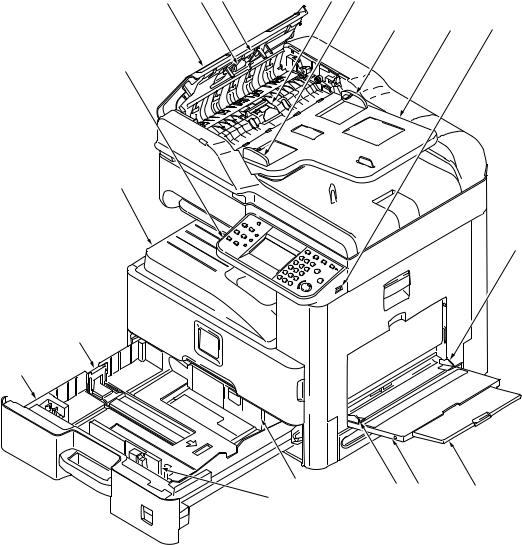
2K3/2L3
1-1-2 Parts names
(1) Machine (front side)
9 |
10 11 |
12 13 |
13 14 15
8
7
6
3
1
2 |
2 |
6 |
4 |
5 |
|
|
|
|
|
|
Figure 1-1-1 |
|
1. |
Cassette |
9. |
DP top cover *1 |
2. |
Paper width guides |
10. |
DP paper feed roller *1 |
3. |
Paper length guide |
11. |
DP forwarding roller *1 |
4. |
MP (multi purpose) tray |
12. |
DP separation pully *1 |
5. |
MP tray extension |
13. |
DP original width guides *1 |
6. |
MP Paper width guides |
14. |
Original table *1 |
7. |
Inner tray |
15. |
USB memory slot |
8. |
Operation panel |
|
|
*1 : Only Model with Document Processor as standard
1-1-5
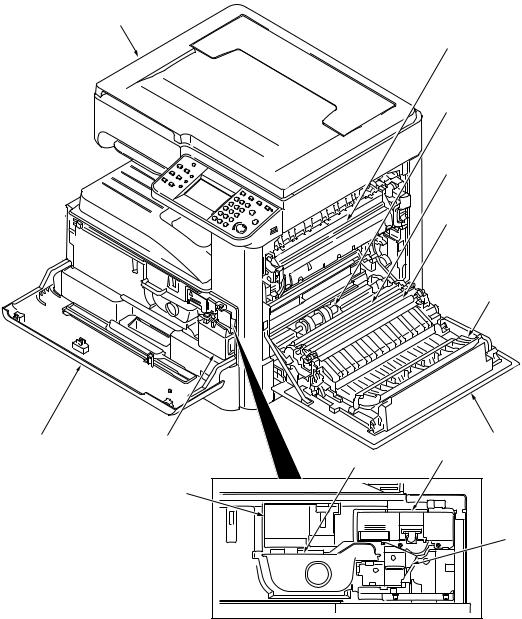
2K3/2L3
24
28
20
21
22
23
16 |
18 |
17 |
25 |
19 |
|
|
|
||
|
|
|
|
|
|
27 |
|
|
|
|
|
|
|
26 |
|
|
Figure 1-1-2 |
|
|
16. |
Front cover |
23. |
Feed shift guide |
17. |
Toner container |
24. |
Original cover *2 |
18. |
Waste toner box |
25. |
Drum unit |
19. |
Right cover 1 |
26. |
Developing unit |
20. |
MP paper feed roller |
27. |
Toner container lever |
21. |
Registration roller |
28. |
Fuser unit |
22. |
Transfer roller |
|
|
*2 : Only Model with original cover as standard
1-1-6
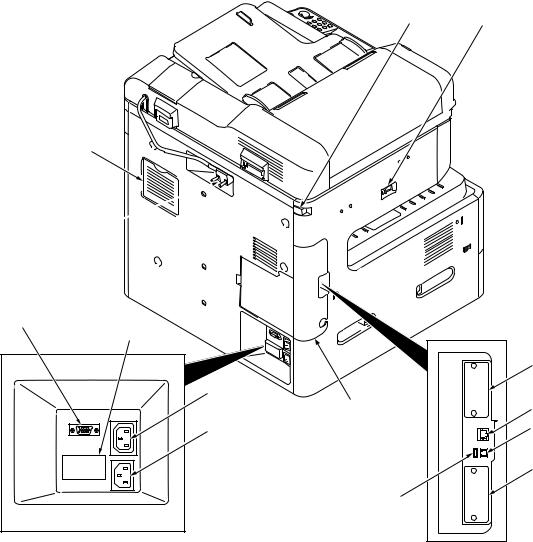
2K3/2L3
(2) Machine (rear side)
42 29
30
31 
33 |
34 |
|
|
|
|
|
|
37 |
|
35 |
39 |
|
32 |
|
|
36 |
40 |
|
|
|
|
|
38 |
|
|
41 |
Figure 1-1-3
29. |
Main power switch |
36. |
Inlet connector |
30. |
Filter cover |
37. |
Option interface slot 1 |
31. |
DP interface connector |
38. |
Option interface slot 2 |
32. |
Controller box cover |
39. |
Network interface connector |
33. |
DF interface connector |
40. |
USB port |
34. |
Cassette heater switch (cover) |
41. |
USB interface connector |
35. |
Outlet connector |
42. |
Scanner lock lever |
1-1-7
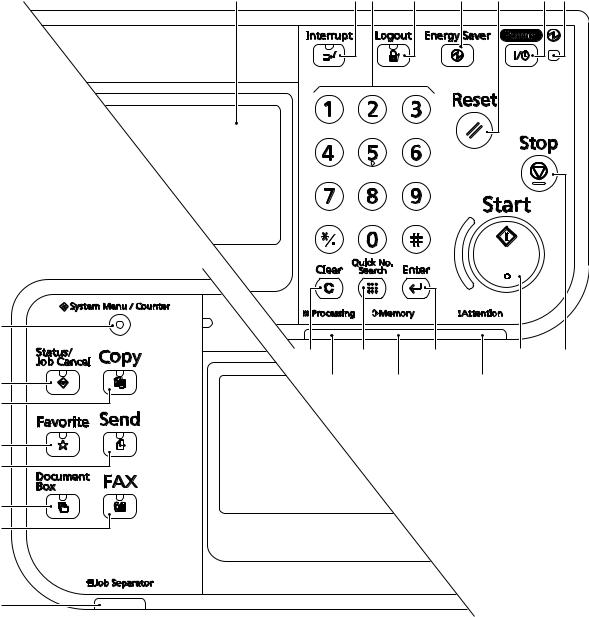
2K3/2L3-1
(3) Operation panel
1 |
2 |
3 |
4 |
5 |
6 |
7 |
8 |
14 |
|
|
|
|
|
|
|
9 |
10 |
11 |
12 |
13 |
15 |
22 |
23 |
24 |
|
16 |
|
|
|
|
17 |
|
|
|
|
18 |
|
|
|
|
19 |
|
|
|
|
20 |
|
|
|
|
21
|
|
|
Figure 1-1-4 |
|
|
1. |
Message display |
10. |
Quick No.search key |
18. |
Send key / LED |
2. |
Interrupt key / LED |
11. |
Enter key |
19. |
Document box key / LED |
3. |
Numeric keys |
12. |
Start key / LED |
20. |
FAX key / LED |
4. |
Logout key / LED |
13. |
Stop key |
21. |
Job separator LED |
5. |
Energy saver / LED |
14. |
System menu/Counter key |
22. |
Processing LED |
6. |
Reset key |
|
/ LED |
23. |
Memory LED |
7. |
Power key / LED |
15. |
Status/Job cancel / LED |
24. |
Attention LED |
8. |
Main power LED |
16. |
Copy key / LED |
|
|
9. |
Clear key |
17. |
Favorite key / LED |
|
|
1-1-8
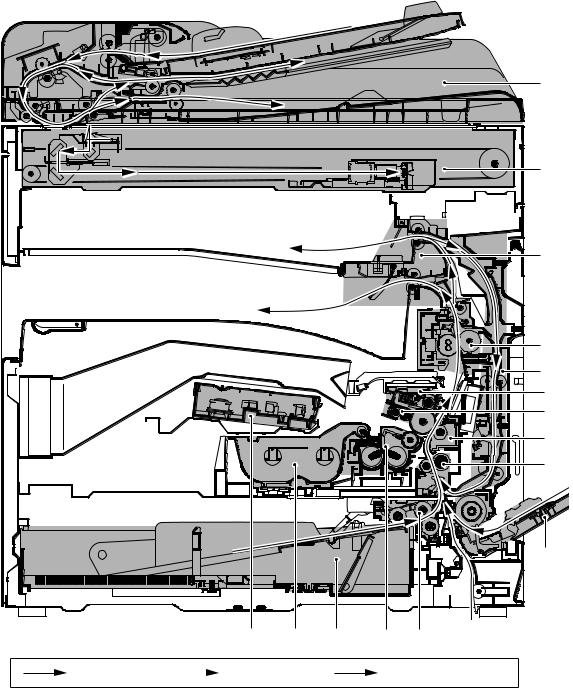
|
|
|
|
|
2K3/2L3 |
1-1-3 |
Machine cross section |
|
|
|
|
|
|
|
|
|
15 |
|
|
|
|
|
13 |
|
|
|
|
|
11 |
|
|
|
|
|
10 |
|
|
|
|
|
12 |
|
|
|
|
|
7 |
|
|
|
|
|
6 |
|
|
|
|
|
5 |
|
|
|
|
|
4 |
|
|
|
|
|
3 |
|
14 |
9 |
1 |
8 |
2 |
|
Light path |
|
Paper path |
Paper path (option) |
|
|
|
||||
|
|
|
Figure 1-1-5 |
|
|
1. |
Cassette |
7. |
Drum unit |
13. |
Image scanner unit (ISU) |
2. |
Cassette paper feed section |
8. |
Developer unit |
14. |
Laser scanner unit (LSU) |
3. |
MP tray paper feed section |
9. |
Toner container |
15. |
Document processor (DP) *3 |
4. |
Conveying section |
10. |
Fuser unit |
|
|
5. |
Transfer/Separation section |
11. |
Eject section |
|
|
6. |
Charger roller unit |
12. |
Duplex/conveyning section |
|
|
*3 : Model with Document Processor as standard
1-1-9

2K3/2L3
This page is intentionally left blank.
1-1-10
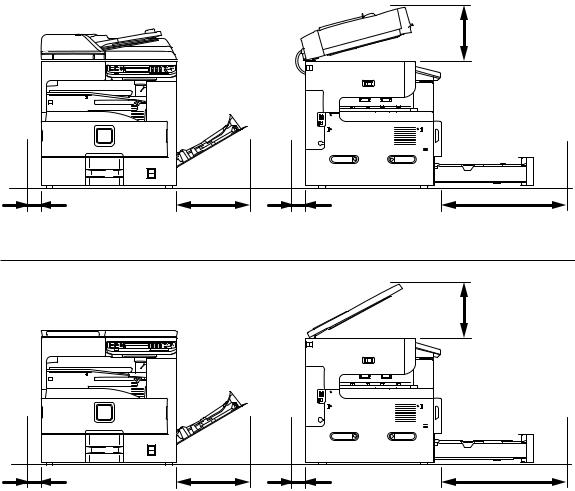
2K3/2L3
1-2-1 Installation environment
1.Temperature: 10 to 32.5°C/50 to 90.5°F
2.Humidity: 15 to 80% RH
3.Power supply: 120 V AC, 12.0 A
220 - 240 V AC, 6.5 A
4.Power supply frequency: 50 Hz ±2%/60 Hz ±2%
5.Installation location
Avoid direct sunlight or bright lighting. Ensure that the photoconductor will not be exposed to direct sunlight or other strong light when removing paper jams.
Avoid locations subject to high temperature and high humidity or low temperature and low humidity; an abrupt change in the environmental temperature; and cool or hot, direct air.
Avoid places subject to dust and vibrations.
Choose a surface capable of supporting the weight of the machine.
Place the machine on a level surface (maximum allowance inclination: 1°).
Avoid air-borne substances that may adversely affect the machine or degrade the photoconductor, such as mercury, acidic of alkaline vapors, inorganic gasses, NOx, SOx gases and chlorine-based organic solvents.
Select a well-ventilated location.
6.Allow sufficient access for proper operation and maintenance of the machine.
(Model with Document Processor as standard)
500 mm
19 11/16”
100 mm |
350 mm |
100 mm |
1000 mm |
3 15/16” |
13 3/4” |
3 15/16” |
39 3/8” |
(Model with Original cover as standard)
450 mm
17 11/16”
100 mm |
350 mm |
100 mm |
1000 mm |
3 15/16” |
13 3/4” |
3 15/16” |
39 3/8” |
|
|
Figure 1-2-1 |
|
|
|
1-2-1 |
|
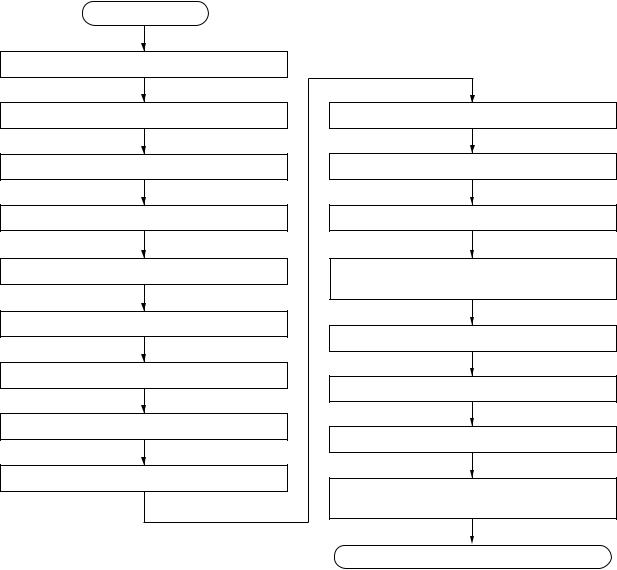
1-2-2 Unpacking and installation
(1) Installation procedure
Start
Unpack
Remove the tapes and spacer
Install the job separator tray
Release the scanner lock lever
Install the optional paper feeder (option)
Load paper
Install the toner container
Install the expansion memory (option)
Switch the cassette heater switch
2K3/2L3
Install the other optional devices
Connect the power cord
Installing toner
Output an own-status report (maintenance item U000)
Exit maintenance mode
Print out the user setting list
Make test copies
Attaching the language label (Excluding 240V AC)
Completion of the machine installation
1-2-2
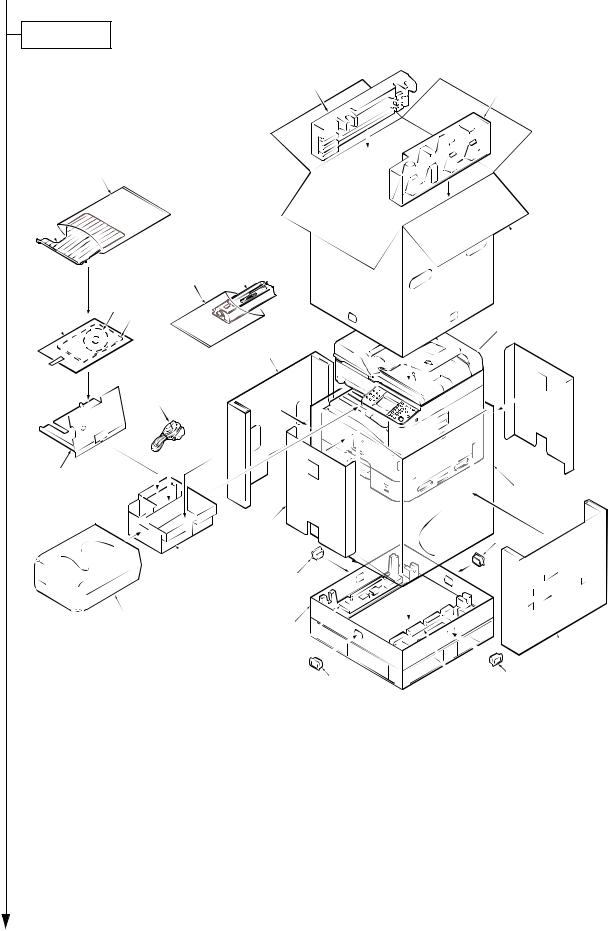
2K3/2L3
Unpacking
l
13 |
12 |
|
21
20
11
15
16
19 |
17 18 |
5




 24 7
24 7 










14
|
10 |
|
|
|
|
4 |
|
|
|
|
|
|
|
|
|
|
23 |
|
|
22 |
|
|
|
|
|
|
|
|
8 |
|
22 |
|
|
|
|
|
|
|
|
|
|
|
9 |
|
1 |
|
|
|
|
|
|
3 |
|
|
6 |
|
|
|
|
|
|
|
|
|
|
22 |
2 |
22 |
|
|
|
|
Figure 1-2-2 |
|
|
|
1. |
Bottom case |
9. |
Plastic bag (630 × 730) |
17. |
CD-ROM *1 |
|
2. |
Bottom pad R |
10. |
Spacer B |
18. |
Installation guide, etc. |
|
3. |
Bottom pad L |
11. |
Outer case |
19. |
Plastic bag |
|
4. |
Machine cover (740 × 700) |
12. |
Upper pad R |
20. |
Job separator tray |
|
5. |
Machine |
13. |
Upper pad L |
21. |
Plastic bag (400 × 600) |
|
6. |
Inner case R |
14. |
Power cord |
22. |
Hinge joints |
|
7. |
Inner case L |
15. |
Toner container |
23. |
Inner case F |
|
8. |
Spacer A |
16. |
Plastic bag (400 × 600) |
24. |
Inner case B |
|
*1 Excluding 230V AC model
Place the machine on a level surface.
1-2-3
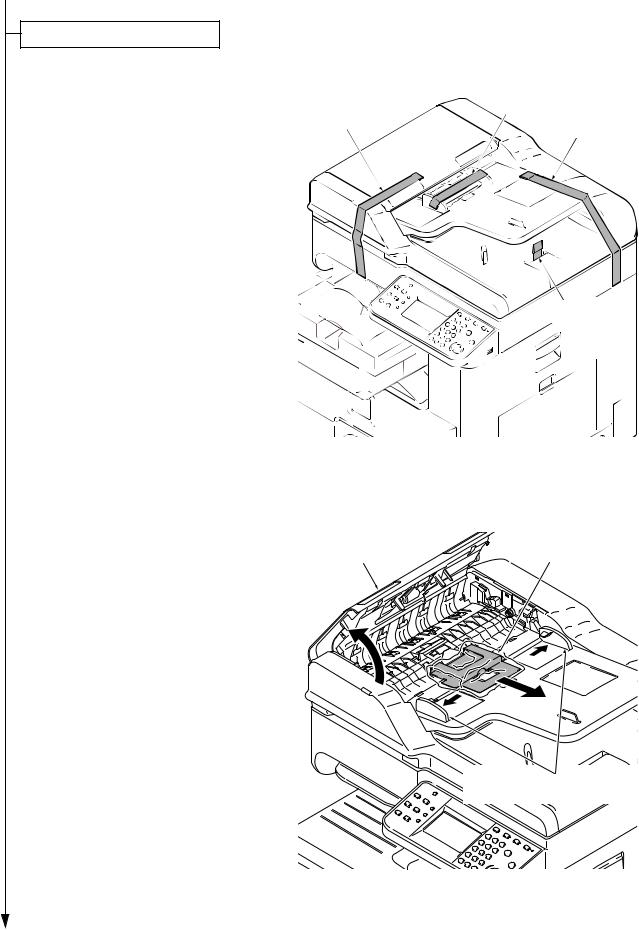
2K3/2L3
Remove the tapes and spacer
(Model with Document Processor as standard)
1. Remove four tapes. |
Tape |
Tape
Tape
Tape
Figure 1-2-3
2. |
Open the DP top cover. |
DP top cover |
Pad |
|
3. |
Slide two DP original width guides and |
|||
|
|
|||
|
then remove the pad. |
|
|
|
4. |
Close the DP top cover. |
|
|
DP original width guide
Figure 1-2-4
1-2-4
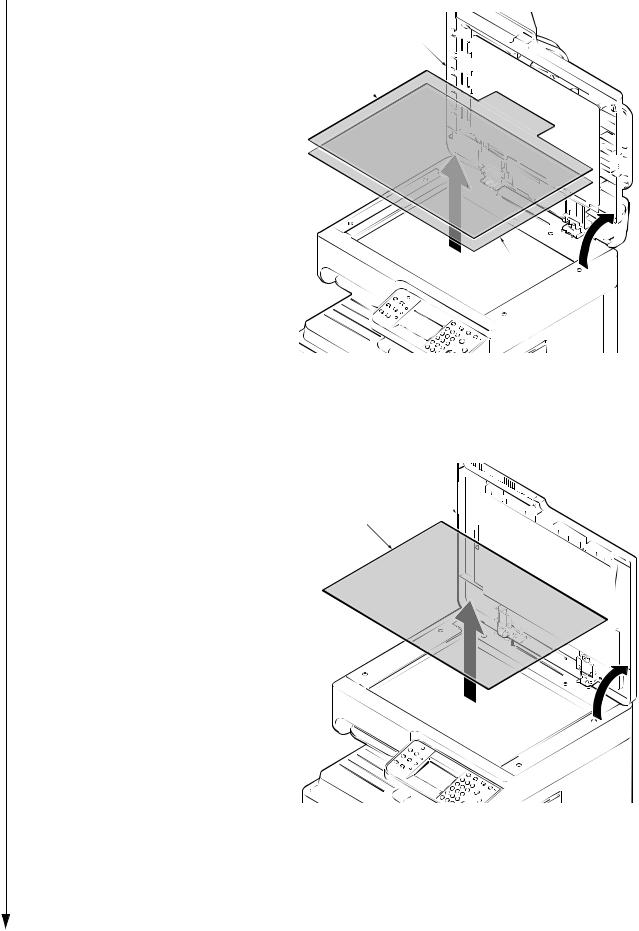
5.Open the DP.
6.Remove the protective sheet and paper.
(Model with Original cover as standard)
1.Open the original cover.
2.Remove the paper.
2K3/2L3
DP
Protective sheet
Paper
Figure 1-2-5
Original cover
Paper
Figure 1-2-6
1-2-5
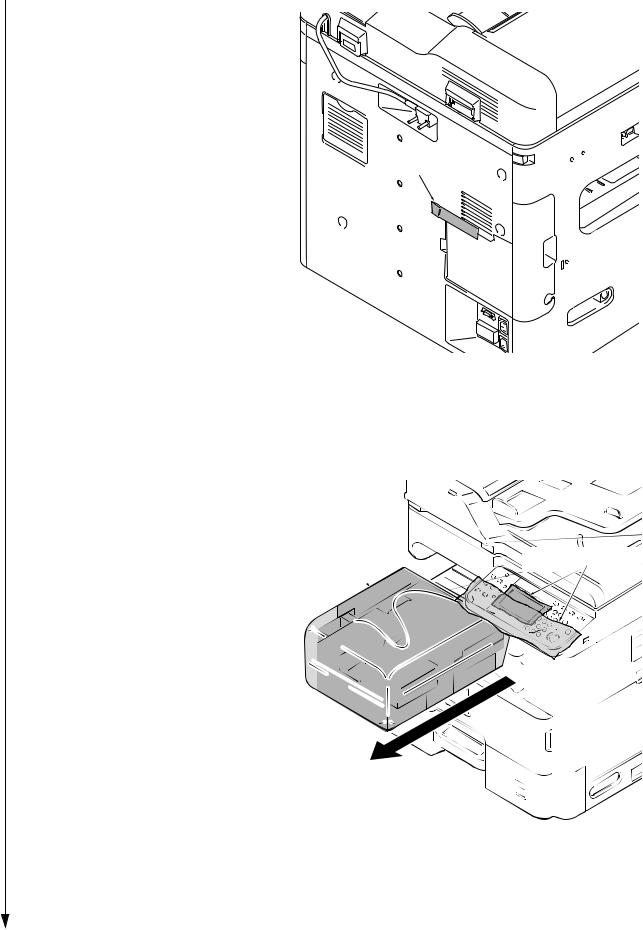
2K3/2L3
(Common work)
1. Remove the tape.
Tape
Figure 1-2-7
2. Peel off two protective sheets.
3. Remove the spacer.
Spacer |
Protective sheets |
|
Figure 1-2-8
1-2-6
